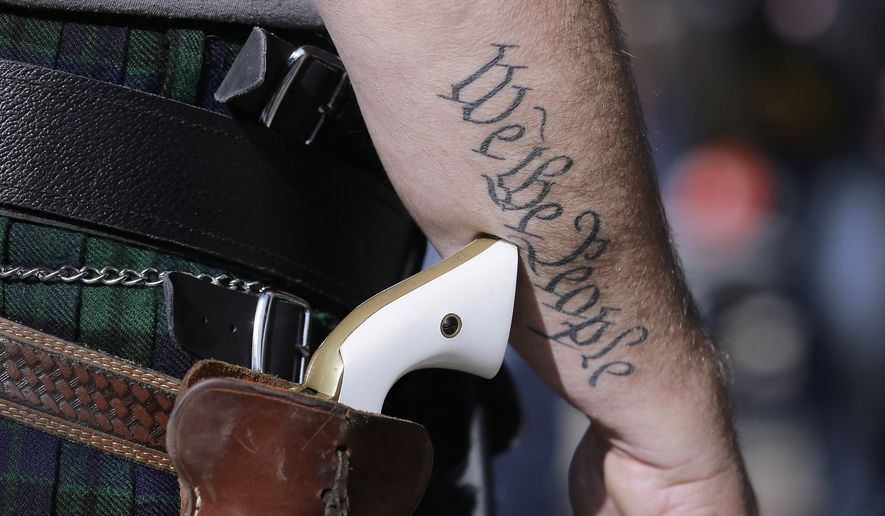The Supreme Court announced Monday it had declined to hear two Second Amendment cases, leaving intact gun control laws in Maryland that restrict the types of weapons that can be bought, and in Florida that largely prevent gun owners from carrying their weapons in the open.
The justices denied both cases without comment, leaving in place lower-court rulings upholding the two laws.
Eric Friday, who represented gun owners in the Florida case, said he thought the court’s Second Amendment supporters were making a strategic decision in refusing to hear the cases, keeping their powder dry for later, when they may have more support on the high court.
“This fight for the Second Amendment is not a short-term fight, this is a long-term fight,” Mr. Friday told The Washington Times. “We are not going to quit just because the Supreme Court didn’t take two cases.”
The Florida case involved a challenge to the state’s ban on open carry, which extends to even those licensed to carry a concealed weapon.
Dale Norman challenged the law after he was arrested and fined for brandishing his firearm holster, which was visible while he was walking down the street. He argued prohibiting open carry violated his constitutional rights, but the Florida Supreme Court sided with the state.
In the Maryland case, gun owners had challenged the state’s ban on some semiautomatic rifles and large-capacity ammunition magazines. The 4th U.S. Circuit Court of Appeals rejected those complaints, saying the Second Amendment doesn’t protect military-style gear.
“Put simply we have no power to extend Second Amendment protection to the weapons of war,” wrote Circuit Judge Robert B. King in the opinion.
Maryland Attorney General Brian Frosh said the Supreme Court’s decision not to review his state’s “common-sense law” confirms all states have the right to protect their citizens from “weapons of war.”
“Assault weapons, which have resulted in the slaughter of hundreds of people in recent months, are not protected by the Second Amendment. The Firearm Safety Act remains the law in Maryland,” Mr. Frosh said.
But the National Rifle Association’s Institute for Legislative Action said the Supreme Court had previously ruled common-use firearms are protected by the Second Amendment and shouldn’t be banned outright.
“Maryland’s ban on commonly owned firearms and magazines violates our fundamental, individual right to keep and bear arms for self-defense,” the organization said in a statement Monday afternoon.
The justices also announced Monday they won’t hear a challenge to a Texas school district’s practice of opening school board meetings with student-led prayer.
The American Humanist Association, a progressive organization, appealed to the high court after the 5th U.S. Circuit Court of Appeals ruled in favor of the Birdville Independent School District in March, saying the prayers didn’t violate the First Amendment’s Establishment Clause.
The justices refused to hear the association’s appeal, so the appeals court ruling, which said the school district’s practice didn’t coerce students to pray, remains in place.
“The presence of students at board meetings does not transform this into a school-prayer case,” the lower court’s opinion read.
Another case the justices declined to review was out of Mississippi, where an African-American lawyer argued the Confederate battle flag in the corner of Mississippi’s state flag violated the Constitution’s Equal Protection Clause. The lower court said the lawyer did not have standing to bring the lawsuit.
The justices did not give a reason for declining to take any of the cases.
• Alex Swoyer can be reached at aswoyer@washingtontimes.com.




Please read our comment policy before commenting.